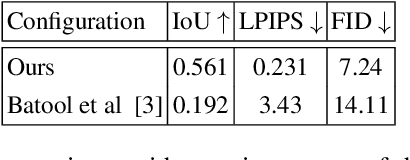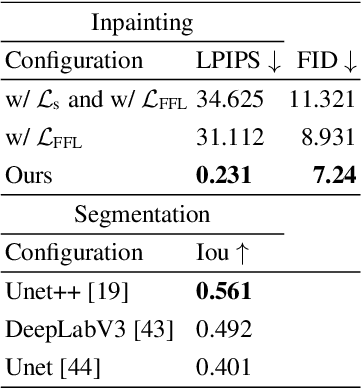Marcelo Sanchez
RETHINED: A New Benchmark and Baseline for Real-Time High-Resolution Image Inpainting On Edge Devices
Mar 18, 2025



Abstract:Existing image inpainting methods have shown impressive completion results for low-resolution images. However, most of these algorithms fail at high resolutions and require powerful hardware, limiting their deployment on edge devices. Motivated by this, we propose the first baseline for REal-Time High-resolution image INpainting on Edge Devices (RETHINED) that is able to inpaint at ultra-high-resolution and can run in real-time ($\leq$ 30ms) in a wide variety of mobile devices. A simple, yet effective novel method formed by a lightweight Convolutional Neural Network (CNN) to recover structure, followed by a resolution-agnostic patch replacement mechanism to provide detailed texture. Specially our pipeline leverages the structural capacity of CNN and the high-level detail of patch-based methods, which is a key component for high-resolution image inpainting. To demonstrate the real application of our method, we conduct an extensive analysis on various mobile-friendly devices and demonstrate similar inpainting performance while being $\mathrm{100 \times faster}$ than existing state-of-the-art methods. Furthemore, we realease DF8K-Inpainting, the first free-form mask UHD inpainting dataset.
Photorealistic Facial Wrinkles Removal
Nov 03, 2022



Abstract:Editing and retouching facial attributes is a complex task that usually requires human artists to obtain photo-realistic results. Its applications are numerous and can be found in several contexts such as cosmetics or digital media retouching, to name a few. Recently, advancements in conditional generative modeling have shown astonishing results at modifying facial attributes in a realistic manner. However, current methods are still prone to artifacts, and focus on modifying global attributes like age and gender, or local mid-sized attributes like glasses or moustaches. In this work, we revisit a two-stage approach for retouching facial wrinkles and obtain results with unprecedented realism. First, a state of the art wrinkle segmentation network is used to detect the wrinkles within the facial region. Then, an inpainting module is used to remove the detected wrinkles, filling them in with a texture that is statistically consistent with the surrounding skin. To achieve this, we introduce a novel loss term that reuses the wrinkle segmentation network to penalize those regions that still contain wrinkles after the inpainting. We evaluate our method qualitatively and quantitatively, showing state of the art results for the task of wrinkle removal. Moreover, we introduce the first high-resolution dataset, named FFHQ-Wrinkles, to evaluate wrinkle detection methods.
 Add to Chrome
Add to Chrome Add to Firefox
Add to Firefox Add to Edge
Add to Edge